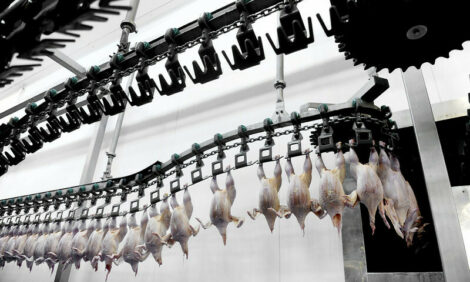



Another pork plant closes as US pork industry faces "dismal" COVID-19 support from government
JBS USA said on Monday (20 April) it would indefinitely shut a hog slaughterhouse that processes around 5 percent of US pork in the latest disruptions to the North American food supply chain from the coronavirus pandemic.JBS said it is closing a pork production facility in Worthington, Minnesota, that employs more than 2,000 workers and processes 20,000 hogs per day. It advised plant employees to follow a state order to stay at home to prevent the spread of the coronavirus, until the facility in Nobles County reopens.
"It is clear that the disease is far more widespread across the US and in our county than official estimates indicate based on limited testing," Bob Krebs, president of JBS USA Pork, said in a statement.
The JBS closure limits the amount of meat the United States can produce for consumers during the outbreak and adds stress on farmers who are already losing a market for their pigs.
The US government has deemed agricultural workers to be essential during the pandemic because they are responsible for maintaining the country's food supply. The Worthington facility will wind down operations over the next two days with a reduced staff so pork that is already in the facility can be "used to support the food supply," Brazilian-owned JBS said.
Rivals Tyson Foods Inc and WH Group Ltd's Smithfield Foods have already closed pork plants due to outbreaks of the contagious respiratory virus among employees. JBS and National Beef Packing Company have shut beef plants.
Meat companies have struggled as workers have stayed home out of fear of contracting the virus at plants, despite efforts by processors to promote social distancing.
"When COVID-19 is prevalent in the community, fear is heightened, absenteeism rises and the challenge of keeping the virus out becomes greater," JBS said. "When absenteeism levels become too high, facilities cannot safely operate."
It was announced this week that a $19 billion relief programme will be established to help US farmers weather the impacts of the coronavirus – including food buys for poor Americans and $16 billion in direct payments.
The USDA said it will make monthly purchases totalling about $100 million each of fresh produce, dairy products and meat products. Perdue said USDA will work with companies like Sysco Corp to help procure, package and distribute food boxes.
Given the economic disruption caused by the pandemic, farmers and ranchers have struggled to bring their goods to market. Many have been forced to dump what they have produced and call for government assistance.
Disappointingly, this relief programme appears to have grossly overlooked the pork industry and, according to analysis provided to National Hog Farmer by Kerns and Associates, pork has received less allocation in USDA COVID-19 support than the hemp industry and its affiliates.
Joseph Kerns says that the package phrasing seems to address the show pig industry as opposed to the commercial producers that feed the US and the rest of the world.
"If you are a 2,500-sow producer, the payment limit ($250,000) represents about $4 per pig of your annualised production," says Kerns. "At a time when you are losing in excess of $40 per head with the prospects of the same indefinitely into the future... the clueless nature of this legislation has got to cause a producer to ponder whether the representation of his tax dollars show an equitable return."
Equally as frustrating for some producers is that all monetary assets are considered before support packages are allocated. According to this report, packer sale or hedges set up to afford you price protection would be considered so producers with this could possibly receive less money from the government. Kerns says that producers are essentially being punished for having the foresight and willingness to protect themselves against loss rather than relying on government payouts.
Support packages may develop over time so affected industries await further communication from US government.






